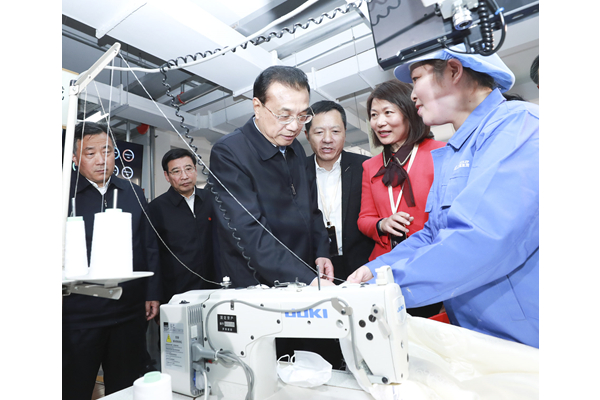
Premier Li Keqiang visits Luolai Lifestyle Technology Co during an inspection in Jiangsu province on Nov 29.
China will intensify its support for the development of the private sector, and small and medium-sized enterprises (SMEs) to boost the vitality of market entities and enhance their confidence, an executive meeting of the State Council, China’s cabinet, decided on Dec 24. The meeting was chaired by Premier Li Keqiang.
The growth of SMEs has been high on the Chinese government’s agenda. An array of policy incentives in the fiscal, tax, and financial fields and in relation to the business climate and public services has been introduced to support SME development. These policies have paid off.
President Xi Jinping emphasized on several occasions the need to protect the lawful rights and interests of private enterprises. Premier Li Keqiang called for giving stronger support to private businesses and SMEs to ease their financing woes and promote the integrated development of businesses of all sizes.
The private sector in China, which is mainly composed of SMEs accounting for 90 percent of all businesses, now contributes more than 50 percent of tax revenue, over 60 percent of GDP, more than 70 percent of technological innovations and over 80 percent of urban employment. Private businesses have become a key driving force for economic growth and social progress.
“Intensified support for growth of the private sector, especially SMEs, helps enhance the internal dynamism for economic growth,” Premier Li said. “To boost the private sector of the economy and micro and small businesses, it is crucial to create a level-playing field, especially in property protection and market access for these businesses to compete in a law-based, neutral environment.”
Efforts will be made to foster a fair and convenient business environment. The views of businesses must be heeded in deciding business-related policies, and reasonable transition periods should be arranged. Businesses of all sizes and all types of ownership will be treated as equals in the tendering, land use and other respects under the principle of competitive neutrality.
Unless otherwise stipulated, all restrictions on the minimum registered capital and the equity structure of private firms will be removed when the firms in question invest in resources development, transportation and public utilities.
Stronger innovation capacity will be supported. Catalogues of recommended products and services will be issued to help high-tech SMEs gain better access to the market. Private firms will also be supported in participating in the R&D of core technologies and the formulation of national standards.
Deeper tax and fee cuts will be introduced. Financing services will be improved. The required reserve ratio cuts targeting inclusive finance will be refined. The re-lending policy targeting small firms will be expanded to qualified small and medium-sized banks and new-type internet banking.
The permitting processes for the listing of private firms and re-finance will be accelerated. Asset management products and insurance funds will be employed in addressing the risks of equity-backed mortgage of listed private firms.
The lawful rights and interests, including their safety and property, of private entrepreneurs will be protected in accordance with the law, the meeting on Dec 24 urged. No government department, public institution or State-owned enterprise should defer contractual payments owed to private businesses.
Premier Li stressed the importance of keeping policies well-coordinated, consistent and credit-worthy to provide businesses an enabling environment and anchor market expectations.
